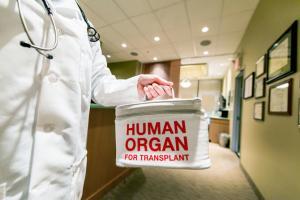For a population of more than a billion, there has been an ever-increasing need for organ transplantation, as the death rate for patients suffering from end-stage organ damage has increased rapidly

This picture has been used for representational purposes
In India, the Transplantation of Human Organ Act (THOA) came into existence in 1994 and formed the foundation of much-needed support for organ transplantation program in India. For a population of more than a billion, there has been an ever-increasing need for organ transplantation, as the death rate for patients suffering from end-stage organ damage has increased rapidly with no other treatment options other than an organ transplant. The Deceased Brain Death (DBD) rate in India has abysmally remained below 0.05 per million population for several years.
The hesitation of the people about organ donation came in the form of sociocultural factors, false beliefs, superstitions, lack of awareness and knowledge in the public domain. Further roadblocks in healthcare fraternity were in the form of lack of advanced knowledge, procedure and training of DBD, lack of effective communication with families, lack of institutional support, ethical issues and legal lacunae around life support and end-of-life care.
Overcoming Challenges
Several ongoing efforts are made to elude challenges around organ donation program. The THOA Act evolved by 2014. Efforts were taken by a public-private partnership to improve awareness and alleviate the myths around DBD in the general population. Non-governmental organisations (NGO) propagated the knowledge about deceased organ donation and endorsed organ sharing process between states. State governments established their own local centres to consolidate, regulate and coordinate the DBD process. They also made appointments of 'Transplant Coordinators' for better communication and to facilitate smooth and fast coordination between healthcare institutes. Green corridors were established for the timely transfer of organs between hospitals. The media in association with several healthcare organisations contributed by narrating stories of successful complex transplant surgeries by skilful surgeons and felicitating donor families for their valuable contribution.
National Organ and Tissue Transplant Organization (NOTTO) was formed with the function of regulation, coordination, networking, procurement and distribution of organs in association with regional and state-level centres, maintaining a registry of organs and facilitation of organ and tissue donation across the country.
Promising Results
With all the above reforms and efforts, India has witnessed a significant and steady growth of organ
donation rates from 0.05 per million population (pmp) to 0.8 pmp, in a span of less than a decade. Although this is far less than the rates of some countries like Spain (35 pmp), USA (31 pmp) and UK (23 pmp), the growth rate has been promising.
Also Read: Mumbai maintains pace in organ donation with 51 donors
The Road Ahead
Looking into the future, continuous reforms in the organ donation program is the key. This momentum needs to be escalated to a new level so that the gap between organs needed and available is bridged sooner. It can be achieved by improving infrastructure in public hospitals, conducting regular CMEs on deceased organ donation for medical and paramedical staff and regular training and increasing numbers of transplant coordinators. Uniform national guidelines need to be formulated for brain death certification, donor optimisation and medico-legal issues around end-of-life care. Organisational support in the form of more transplant centres with well trained and experienced medical staff with effective communication skills is needed. Changes in medical & life insurance policies for deceased organ donor need to be looked into. Lastly, media continuing to play an important role in increasing awareness and building a positive outlook towards organ donation in general public to gain their trust is of paramount importance.
- By Dr Prashant Borade, Head-Critical Care, Global Hospital
Catch up on all the latest Crime, National, International and Hatke news here. Also download the new mid-day Android and iOS apps to get latest updates
 Subscribe today by clicking the link and stay updated with the latest news!" Click here!
Subscribe today by clicking the link and stay updated with the latest news!" Click here!









